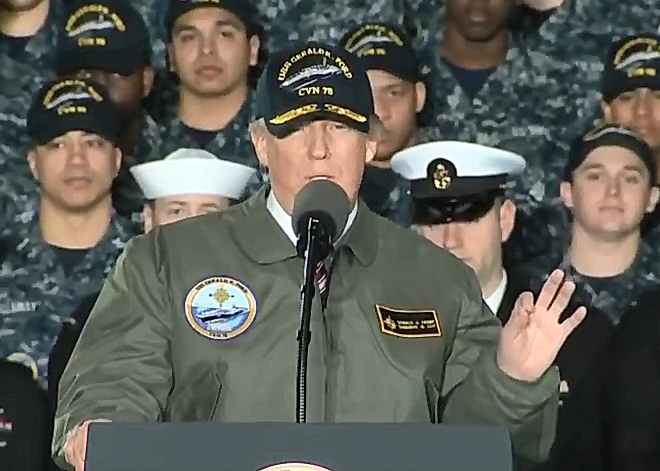If the President is considering whether to defer or rescind military assistance to a foreign country, but has not yet made a decision to do so under the Impoundment Control Act, is he required to notify Congress? That’s what Sen. Chris Van Hollen (D-Md.) wants to know and is asking the Government Accountability Office (GAO) to report on.
The question comes after decisions by the White House to temporarily freeze and review State Department and USAID foreign aid spending in August, and $250 million of military assistance to Ukraine in July. Both reviews were completed, with the broader foreign aid being released on Aug. 7 and the military spending in Ukraine being obligated on Sept. 11. Ultimately, the President chose not to request either a deferral or rescission of the funds.
And yet Democrats want to remove Trump from office over the issue.
The Office of Management and Budget for its part is saying it did nothing wrong, with OMB communications director Rachel Semmel issuing a statement saying, “As has been well documented, we fully complied with the law and decades of precedent with respect to these funds. Congress is notified if the administration intends to rescind, defer, reprogram or transfer funding, but in this case none of those things occurred and the funding was obligated as planned.”
Under 2 U.S.C. Section 684 or 2 U.S.C. Section 683, the Impoundment Control Act, the President has the power to propose deferring funds on a temporary basis or rescinding them altogether, subject to Congressional approval.
The question here appears to be what obligation the President has to spend the money whilst considering such a deferral or rescission. The answer comes under OMB’s authority under 31 U.S.C. 1512 to conduct apportionments, which the White House cited as authority for the three-day spending freeze of foreign aid in August in its letter to the Department of State and USAID.
The letter stated, “All previously apportioned unobligated resources in the [Treasury Appropriation Fund Symbols] shall be unavailable for obligation until three business days after the Office of Management and Budget receives an accounting from your agencies of the current outstanding unobligated resources…” The reviews were completed and the funds were released.
At the time, a question posed by critics was whether the funds could be withheld beyond the end of the fiscal year on Sept. 30 while Congress was considering a proposed rescission, effectively preventing funds from being spent and expiring prior to Congress’ consideration.
Last year, GAO asked OMB General Counsel Mark Paoletta for his views on that question, and he submitted them in Nov. 2018, stating, “the text of Impoundment Control Act clearly allows the President to propose and withhold funds at any time in a fiscal year. In addition to the unambiguous statutory language, there is bipartisan historical precedent for the President to withhold funds at any time of the fiscal year, including in instances where funds proposed for rescission have lapsed prior to the expiration of the 45-day withholding period.”
Nonetheless, in Dec. 2018, GAO came back with an opinion saying that the withholding period could not carry into the expiration of the funds: “we conclude that the ICA does not permit the withholding of funds through their date of expiration. The statutory text and legislative history of the ICA, Supreme Court case law, and the overarching constitutional framework of the legislative and executive powers provide no basis to interpret the ICA as a mechanism by which the President may unilaterally abridge the enacted period of availability of a fixed-period appropriation.”
But that opinion is non-binding and in any event, was not at issue here. Given the context of OMB conducting a wider review of foreign aid packages, it is not unreasonable to suppose that foreign military assistance to Ukraine was falling under a similar review.
Here, Congressional Democrats appear ready to vote to impeach and remove President Trump for even considering requesting a rescission of military funding to Ukraine.
Now, this all might be cause to request another opinion from the GAO, or perhaps to ham out a legal dispute in U.S. District Court for the District of Columbia over the limits of fiscal apportionment and rescission law. That’s not a high crime, misdemeanor, treason or bribery, it’s a dispute between the branches over what the letter of the law means.
In the end, however, no rescissions were even sought, and certainly none carrying through the end of the fiscal year, and all the monies were ultimately spent, rendering the question moot. This is what Democrats want to overturn the 2016 election over? C’mon.
Robert Romano is the Vice President of Public Policy at Americans for Limited Government.







